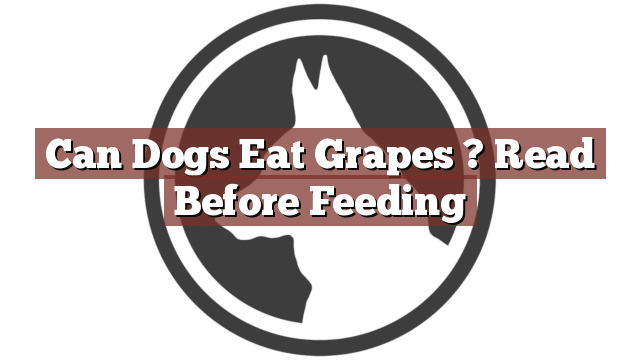Understanding Your Dog’s Dietary Needs
As a responsible dog owner, it is crucial to understand your canine companion’s dietary needs. Dogs have different nutritional requirements compared to humans, and certain foods that are safe for us may be harmful to them. Providing a well-balanced diet is essential for their overall health and wellbeing. While dogs primarily thrive on a diet consisting of high-quality dog food, sometimes, we may wonder if they can eat certain human foods like grapes. It is important to educate ourselves about the potential risks and benefits before introducing any new food into our furry friend’s diet.
Can Dogs Eat Grapes? Read Before Feeding
Can dogs eat grapes? This is a question that often arises among dog owners. The answer, in bold, is no. Grapes, along with raisins, have been found to be toxic to dogs. While the exact component responsible for the toxicity is unknown, it is advised to err on the side of caution and avoid feeding grapes or raisins to your four-legged friend. Even small amounts can lead to serious health issues, including kidney failure, which can be life-threatening.
If you suspect your dog has ingested grapes or raisins, it is important to seek veterinary care immediately. The symptoms of grape or raisin toxicity may include vomiting, diarrhea, abdominal pain, decreased appetite, lethargy, and increased thirst and urination. Prompt veterinary attention is necessary to prevent further complications and ensure your dog’s well-being.
Pros and Cons of Feeding Grapes to Dogs
When it comes to feeding grapes to dogs, the cons heavily outweigh any potential pros. Grape consumption can lead to severe health consequences for your furry friend, making it an unsafe choice. While grapes are a delicious and nutritious snack for humans, they should never be offered to dogs.
It is worth noting that not all dogs may display symptoms of grape or raisin toxicity, even if they have consumed these fruits. However, this does not mean that they are immune to the harmful effects. Since it is difficult to determine which dogs may be more susceptible to grape toxicity and the safe threshold for consumption, it is advised to completely avoid giving grapes or raisins to your dog.
Conclusion: Be cautious, grapes can be harmful to dogs
In conclusion, it is important to remember that grapes should never be fed to dogs. The potential risks and unknown factors associated with grape or raisin toxicity make it a matter of concern for every dog owner. Even small amounts of grapes can lead to serious health issues, including kidney failure. It is always better to be cautious and prioritize your dog’s health and safety by avoiding feeding grapes or raisins altogether. If you are looking for safe and healthy treat options for your furry friend, consult with your veterinarian for suitable alternatives that align with your dog’s dietary needs.
Thank you for taking the time to read through our exploration of [page_title]. As every dog lover knows, our furry friends have unique dietary needs and responses, often varying from one canine to another. This is why it's paramount to approach any changes in their diet with caution and knowledge.
Before introducing any new treats or making alterations to your dog's diet based on our insights, it's crucial to consult with a veterinarian about [page_title]. Their expertise ensures that the choices you make are well-suited to your particular pet's health and well-being.
Even seemingly harmless foods can sometimes lead to allergic reactions or digestive issues, which is why monitoring your dog after introducing any new food item is essential.
The content provided here on [page_title] is crafted with care, thorough research, and a genuine love for dogs. Nevertheless, it serves as a general guideline and should not be considered a substitute for professional veterinary advice.
Always prioritize the expert insights of your veterinarian, and remember that the health and happiness of your furry companion come first.
May your journey with your pet continue to be filled with joy, love, and safe culinary adventures. Happy reading, and even happier snacking for your canine friend!

